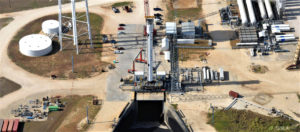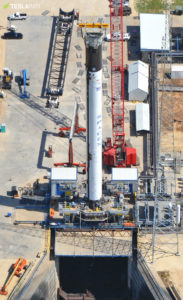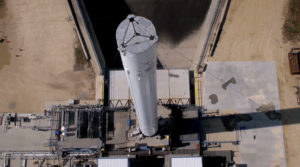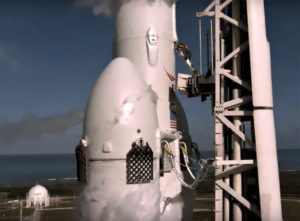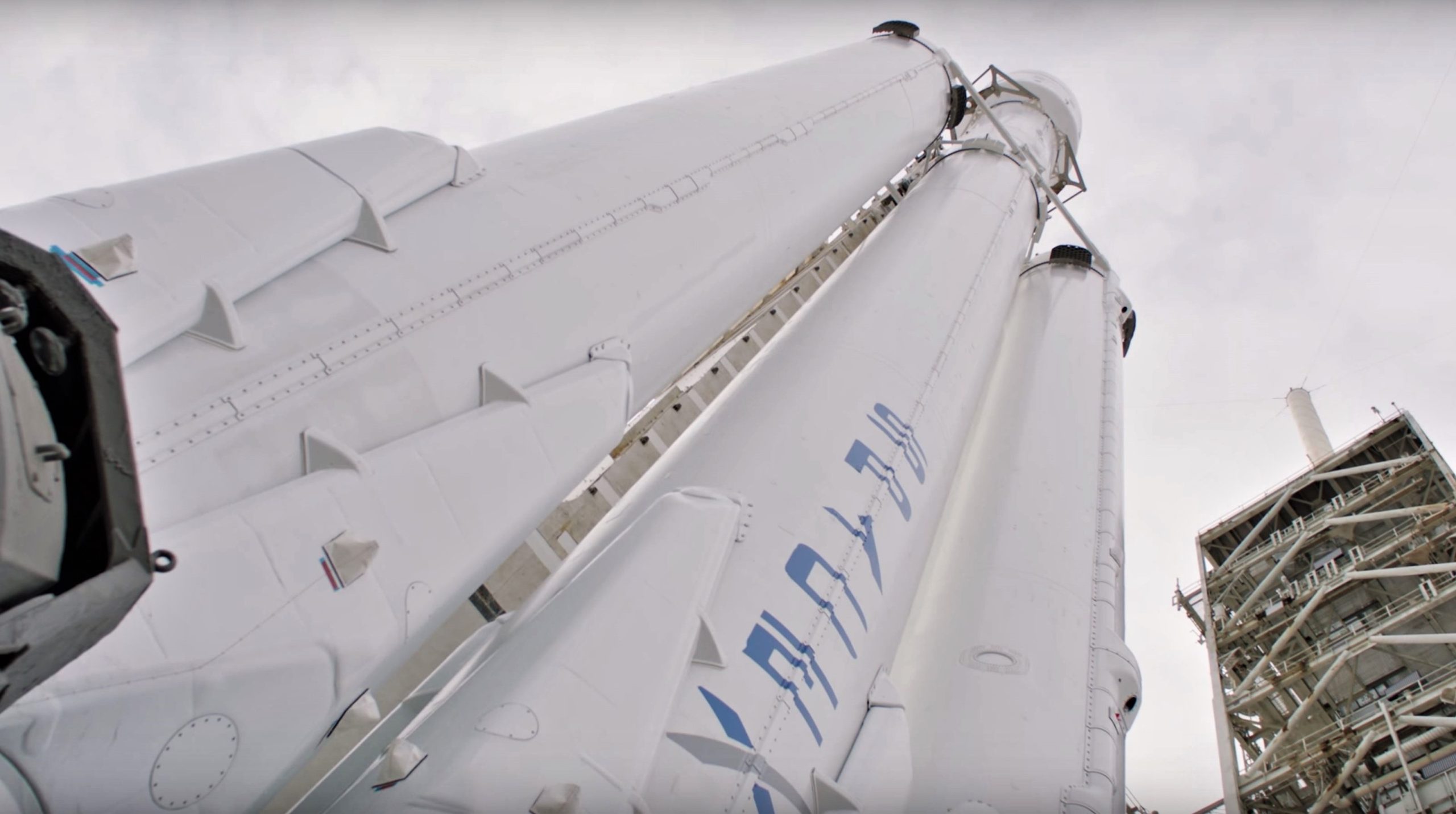
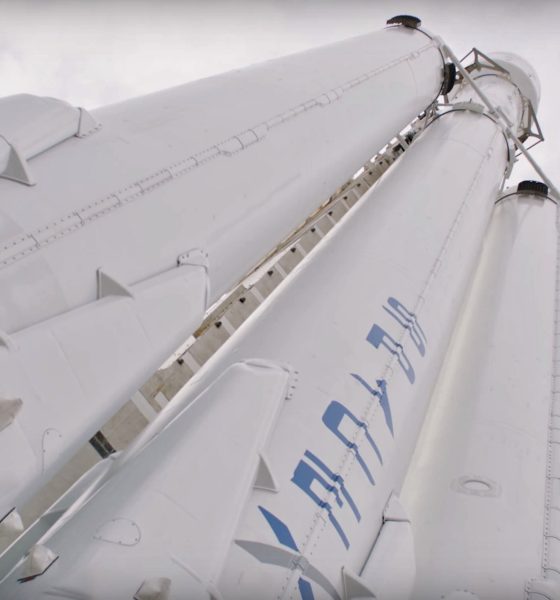
News
SpaceX’s next Falcon Heavy side booster arrives in Texas for hot-fire testing
A few days after a brief appearance in Arizona, SpaceX’s next Falcon Heavy side booster has been spotted vertical at the company’s McGregor, Texas first stage test stand, likely just days away from the rocket’s first static-fire ignition test.
By all appearances a newly manufactured booster, this hardware is the first public evidence of serious preparations for the second flight of SpaceX’s Falcon Heavy.
Look who was waving at passing planes over McGregor today!
A Falcon Heavy side booster on the McGregor test stand for a static fire test. pic.twitter.com/S7af6b0gHk
— NSF – NASASpaceflight.com (@NASASpaceflight) November 18, 2018
Taking as little as a week to go from SpaceX’s Hawthorne factory to its McGregor first stage test stand, this Falcon Heavy side booster appears to be a new rocket, barring the possibility that it’s an older flight-proven booster that has since been modified extensively with Block 5 hardware and had all visible soot cleaned off.
Most notably, if this booster is not effectively identical to any given Falcon 9 Block 5 first stage, widespread changes to avionics, software, and firmware would be required to ensure compatibility between an older variant of Falcon 9 and its Block 5 predecessors. Among countless other changes, Falcon 9 Block 5 features a ~10% thrust increase, an almost clean-slate avionics refresh, and major structural upgrades throughout the booster.
- SpaceX tests all new Falcon 9 boosters and upper stages in Texas before launch. (Aerial Photo/Teslarati)
- B1047 captured testing in McGregor, Texas, April 2018. (Teslarati/Aero Photo)
- A pre-Block 5 Falcon 9 conducts tests at SpaceX’s McGregor testing facility in central Texas. (SpaceX)
- Falcon Heavy is seen here lifting off during its spectacular launch debut. (SpaceX)
With almost a full year now expected between Falcon Heavy’s first and second flights, the chances that the second vehicle wont be entirely composed of Block 5 hardware are slim to none. Anything less than a sort of fixed Falcon Heavy design would undoubtedly make it harder for SpaceX to certify the heavy-lift rocket for both NASA and USAF launches in the eyes of each agency, much like both have struggled to bend their highly inflexible certification requirements to SpaceX’s strategy of continuous hardware and software improvement.
SpaceX's second Falcon Heavy is slowly but surely coming together 😀 https://t.co/AYJsQ8Mld5
— Eric Ralph (@13ericralph31) November 13, 2018
Ultimately, the fact that an entire side booster is already preparing for static fire tests in Texas suggests that Falcon Heavy’s second launch is going to come sooner rather than later, implying that the payload will the commercial Arabsat 6A satellite rather than the USAF’s STP-2 rideshare. As of June 2018, Arabsat officially stated that the satellite was expected to launch on Falcon Heavy between December and January, a window that has since slipped into no earlier than (NET) late January 2019.

Elon Musk
Elon Musk doubles down on Tesla Cybercab timeline once again
“Cybercab, which has no pedals or steering wheel, starts production in April,” Musk said.
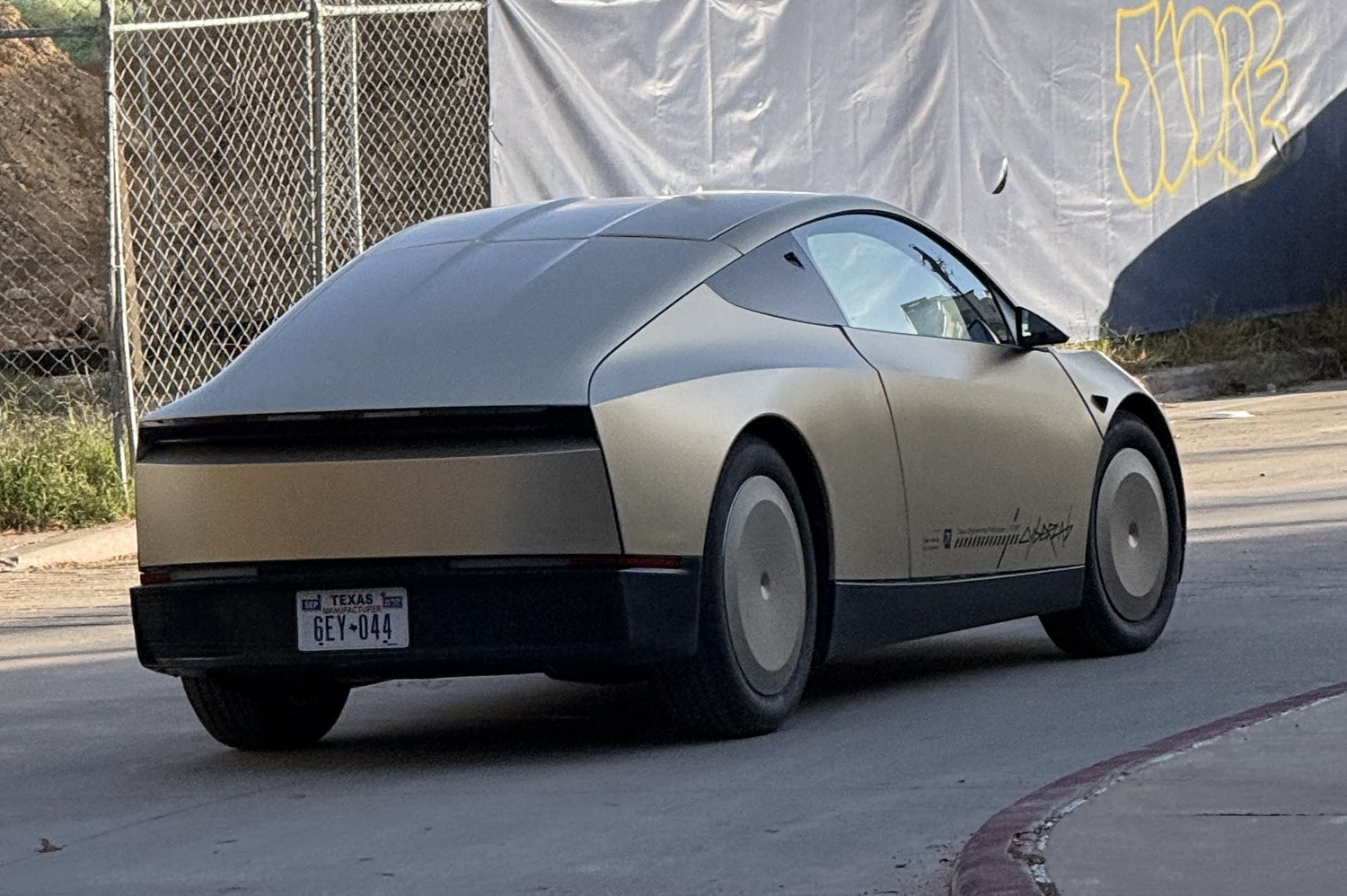
CEO Elon Musk doubled down once again on the timeline of production for the Tesla Cybercab, marking yet another example of the confidence he has in the company’s ability to meet the aggressive timeline for the vehicle.
It is the third time in the past six months that Musk has explicitly stated Cybercab will enter production in April 2026.
On Monday morning, Musk reiterated that Cybercab will enter its initial manufacturing phase in April, and that it would not have any pedals or a steering wheel, two things that have been speculated as potential elements of the vehicle, if needed.
Cybercab, which has no pedals or steering wheel, starts production in April https://t.co/yShxZ2HJqp
— Elon Musk (@elonmusk) February 16, 2026
Musk has been known to be aggressive with timelines, and some products have been teased for years and years before they finally come to fruition.
One of perhaps the biggest complaints about Musk is the fact that Tesla does not normally reach the deadlines that are set: the Roadster, Semi, and Unsupervised Full Self-Driving suite are a few of those that have been given “end of this year” timelines, but have not been fulfilled.
Nevertheless, many are able to look past this as part of the process. New technology takes time to develop, but we’d rather not hear about when, and just the progress itself.
However, the Cybercab is a bit different. Musk has said three times in the past six months that Cybercab will be built in April, and this is something that is sort of out of the ordinary for him.
In December 2025, he said that Tesla was “testing the production system” of the vehicle and that “real production ramp starts in April.
Elon Musk shares incredible detail about Tesla Cybercab efficiency
On January 23, he said that “Cybercab production starts in April.” He did the same on February 16, marking yet another occasion that Musk has his sights set on April for initial production of the vehicle.
Musk has also tempered expectations for the Cybercab’s initial production phase. In January, he noted that Cybercab would be subjected to the S-curve-type production speed:
“…initial production is always very slow and follows an S-curve. The speed of production ramp is inversely proportionate to how many new parts and steps there are. For Cybercab and Optimus, almost everything is new, so the early production rate will be agonizingly slow, but eventually end up being insanely fast.”
Cybercab will be a huge part of Tesla’s autonomous ride-sharing plans moving forward.
Elon Musk
Tesla owners explore potential FSD pricing options as uncertainty looms
We asked Tesla owners what the company should price Full Self-Driving moving forward, as now it’s going to be subscription-based. There were some interesting proposals.

Tesla is starting the process of removing the ability to purchase the Full Self-Driving suite outright, as it pulled the purchase option in the United States over the weekend.
However, there has been some indication by CEO Elon Musk that the price of the subscription will increase as the suite becomes more robust. But Tesla finds itself in an interesting situation with this: the take rate for Full Self-Driving at $99 per month is about 12 percent, and Musk needs a significant increase in this rate to reach a tranche in his new compensation package.
This leaves Tesla and owners in their own respective limbos: Tesla needs to find a price that will incentivize consumers to use FSD, while owners need Tesla to offer something that is attractive price-wise.
We asked Tesla owners what the company should price Full Self-Driving moving forward, as now it’s going to be subscription-based. There were some interesting proposals.
Price Reduction
Although people are willing to pay the $99 per month for the FSD suite, it certainly is too high for some owners. Many suggested that if Tesla would back down the price to $49, or somewhere around that region, many owners would immediately subscribe.
Others suggested $69, which would make a lot of sense considering Musk’s obsession with that number.
Different Pricing for Supervised and Unsupervised
With the release of the Unsupervised version of Full Self-Driving, Tesla has a unique opportunity to offer pricing for different attention level requirements.
$50/mo for supervised.
$300/mo for unsupervised including insurance.— pɦoɿɟ pᴉʌɒp (@CSUDavid) February 15, 2026
Unsupervised Full Self-Driving would be significantly more expensive, but not needed by everyone. Many people indicate they would still like to drive their cars manually from time to time, but others said they’d just simply be more than okay with only having Supervised FSD available in their cars.
Time-Based Pricing
Tesla could price FSD on a duration-based pricing model, including Daily, Weekly, Monthly, and Annual rates, which would incentivize longer durations with better pricing.
Annually, the rate could be $999 per year, while Monthly would stay at $99. However, a Daily pass of FSD would cost somewhere around $10, while a $30 per week cost seems to be ideal.
These all seem to be in line with what consumers might want. However, Tesla’s attitude with FSD is that it is the future of transportation, and with it offering only a Monthly option currently, it does not seem as if it will look as short-term as a Daily pass.
Tiered Pricing
This is perhaps the most popular option, according to what we’ve seen in comments and replies.
This would be a way to allow owners to pick and choose which FSD features they would like most and pay for them. The more features available to you, the more it costs.
For example, if someone only wanted Supervised driving and Autopark, it could be priced at $50 per month. Add in Summon, it could be $75.
This would allow people to pick only the features they would use daily.
News
Tesla leaves a single loophole to purchase Full Self-Driving outright
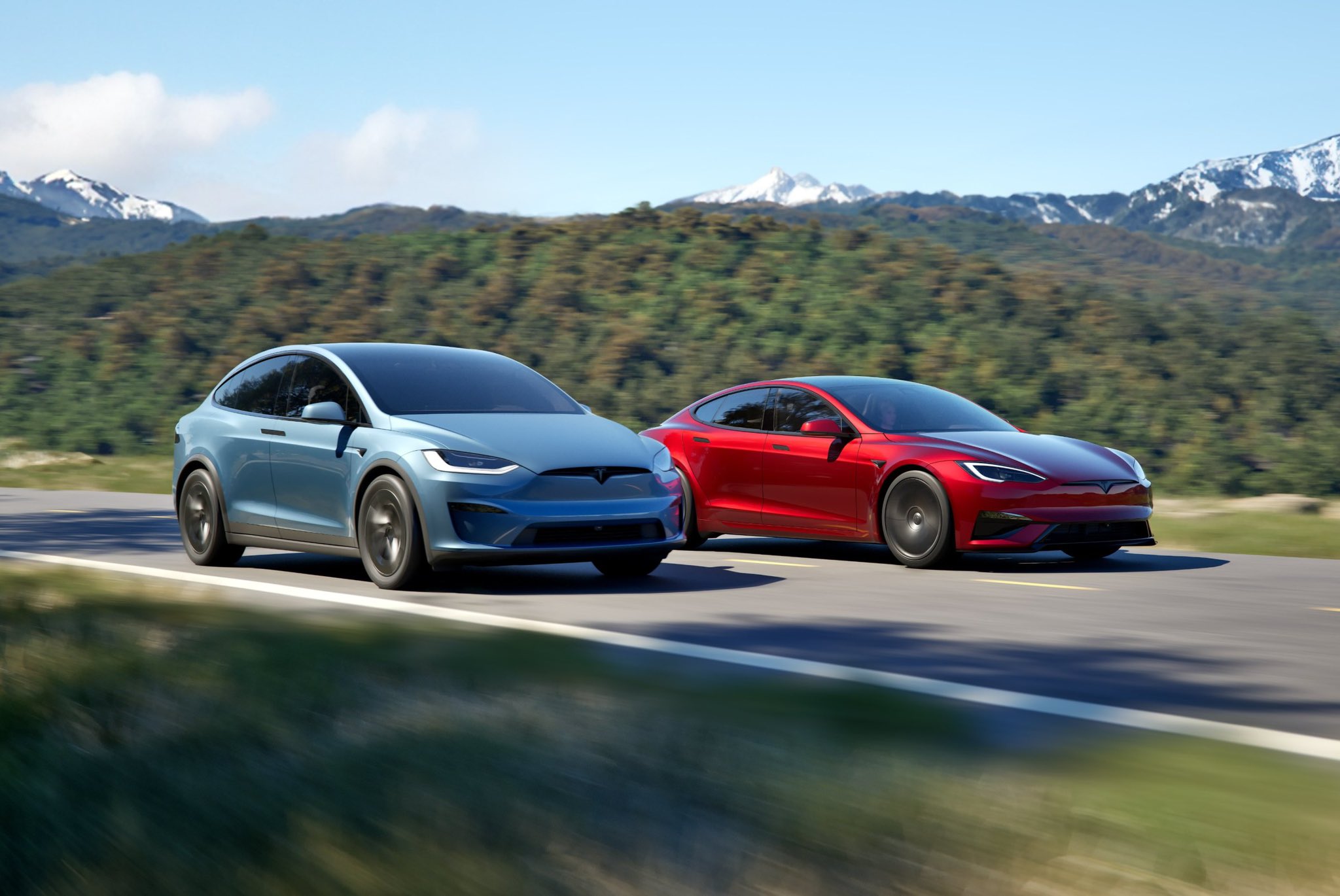
Tesla has left a single loophole to purchase Full Self-Driving outright. On Sunday, the option officially disappeared from the Online Design Studio in the United States, as Tesla transitioned to a Subscription-only purchasing plan for the FSD suite.
However, there is still one way to get the Full Self-Driving suite in an outright manner, which would not require the vehicle owner to pay monthly for the driver assistance program — but you have to buy a Model S or Model X.
Months ago, Tesla launched a special “Luxe Package” for the Model S and Model X, which included Full Self-Driving for the life of the vehicle, as well as free Supercharging at over 75,000 locations, as well as free Premium Connectivity, and a Four-Year Premium Service package, which includes wheel and tire protection, windshiel protection, and recommended maintenance.
🚨 Tesla increased the price of both the Model S and Model X by $10,000, but both vehicles now include the “Luxe Package,” which includes:
-Full Self-Driving
-Four years of included maintenance, tire and wheel repairs, and windshield repairs/replacements
-Free lifetime… pic.twitter.com/LKv7rXruml— TESLARATI (@Teslarati) August 16, 2025
It would also be available through the purchase of a Cyberbeast, the top trim of the Cybertruck lineup.
This small loophole would allow owners to avoid the monthly payment, but there have been some changes in the fine print of the program, as Tesla has added that it will not be transferable to subsequent vehicle owners or to another vehicle.
This goes for the FSD and the Supercharging offers that come with the Luxe Package.
For now, Tesla still has the Full Self-Driving subscription priced at $99 per month. However, that price is expected to increase over the course of some time, especially as its capabilities improve. Tesla seems to be nearing Unsupervised FSD based on Musk’s estimates for the Cybercab program.
There is the potential that Tesla offers both Unsupervised and Supervised FSD for varying prices, but this is not confirmed.
In other countries, Tesla has pushed back the deadline to purchase the suite outright, as in Australia, it has been adjusted to March 31.
